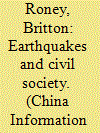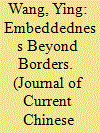| Srl | Item |
| 1 |
ID:
085406


|
|
|
|
|
| Publication |
2008.
|
| Summary/Abstract |
This article investigates how transnational NGO cooperation can influence the official Chinese stance on climate change politics. Drawing on the constructivist approach to international relations, the so-called 'spiral model', developed by Risse et al (1999) for the human rights field, is applied to environmental politics for the first time. The model is tested by process tracing the historical development of the Chinese position on climate change and by analysing the roles and impacts of different actors in different phases of norm internalization. The model is complemented by an in-depth analysis of present transnational NGO campaigns in China. Although results show that international and Chinese NGOs have an influence on Chinese climate politics, the model's assumption about the causes for a norm internalization could only partly be confirmed: instead of the pressurizing strategies of the transnational advocacy network, instruments of sharing information seem to be more effective in changing Chinese climate politics.
|
|
|
|
|
|
|
|
|
|
|
|
|
|
|
|
| 2 |
ID:
104096


|
|
|
|
|
| Publication |
2011.
|
| Summary/Abstract |
The 2008 Wenchuan earthquake presents an opportunity to study certain aspects of civil society in China. Using the 1999 "921" earthquake in Taiwan as a point of comparison, the respective responses of nongovernment organizations (NGOs) to earthquakes in China and Taiwan can be used to elucidate the state of civil society in both countries. The surprisingly robust response to the Wenchuan earthquake by China's NGOs demonstrates the development of an increasingly sophisticated and professional NGO sector in China as well as a growing willingness on the part of the Chinese government to accept a limited role for NGOs in disaster relief, charity work, and the provision of social services. Comparison between the earthquake responses of NGOs in mainland China and Taiwan draws attention to the continued limitations of Chinese NGOs but also allows prediction of key trends in the future development of civil society in China. While Taiwan's highly autonomous and effective NGOs contrast with mainland China's semiautonomous NGOs, the similarities shared by organizations on both sides of the Taiwan Strait suggests that the development of China's civil society may in some ways parallel that of Taiwan.
|
|
|
|
|
|
|
|
|
|
|
|
|
|
|
|
| 3 |
ID:
189902


|
|
|
|
|
| Summary/Abstract |
The internationalisation of Chinese non-governmental Organisations (NGOs) is an emerging phenomenon. As new international development actors, how independent are Chinese NGOs from the Chinese state? Based on interviews with eighteen Chinese NGOs and an analysis of secondary sources, the study finds that the internationalisation of Chinese NGOs is variegated rather than solely state-led. The state is not closely involved in much of the internationalisation processes of a majority of Chinese NGOs. However, all Chinese NGOs with overseas operations avoid overstepping a political boundary that is tacitly understood by both NGOs and the state. To explain the duality of both uniformity and diversity among Chinese NGOs, this study develops an embeddedness framework that disaggregates state influences into a primary layer of systemic regulatory guidance that affects all Chinese NGOs, and a secondary layer of influence over NGOs’ operations (initiation, financing, and implementation), within which the varying levels of governmental influence upon different NGOs lie.
|
|
|
|
|
|
|
|
|
|
|
|
|
|
|
|
| 4 |
ID:
173792


|
|
|
|
|
| Summary/Abstract |
Graduated control models are often used to explain the variety of government treatment of social organizations in China. These models have been slowly losing their explanatory power in recent years, with advocacy-oriented grass-roots groups participating in the policymaking process. Why are these social groups not regulated in the way the graduated control models predict? Based on an analysis of three recent policy advocacy cases, this article proposes a graduated control 2.0 model to explain the new dynamics in Chinese state–society interactions. The upgraded model argues that the government officials’ behaviour patterns are influenced by numerous factors such as the inherent nature of social groups highlighted by graduated control models, and inter-ministerial competition – the power position of the state sector and its rival sector in the bureaucratic system. Some contingent factors also play a part, such as timing and the NGO’s onstage performance. This research contributes to the ongoing discussion on Chinese state–society relations by developing a theoretical model that highlights both the fragmentation and reactiveness of state control over social groups and further unpacks the ‘monolithic state’ in China studies.
|
|
|
|
|
|
|
|
|
|
|
|
|
|
|
|